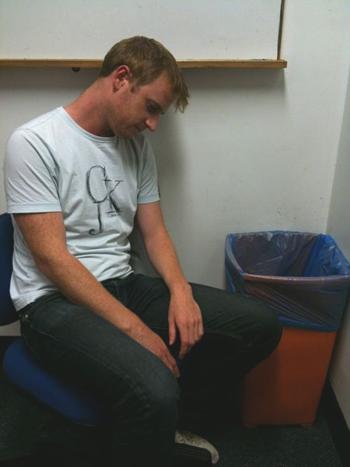What is Powerlessness?
I have been reminded recently that the Christian faith is as offensive and outrageous as it has always been. It is still, as the Apostle Paul put it, a kind of foolishness. That the weakness of the infant Jesus could contain the power at the heart of all of creation is sheer foolishness. That the weakness of the cross could possibly constitute the decisive victory over the forces which  oppose God’s rule seems preposterous. Indeed, it is rare today to find anyone, either within the Christian community or elsewhere, who speaks in praise of weakness. Our understanding of power has become decidedly unparadoxical. We want our power untainted with anything as undesirable as weakness. We prefer peace through strength and salvation through self-reliance.
oppose God’s rule seems preposterous. Indeed, it is rare today to find anyone, either within the Christian community or elsewhere, who speaks in praise of weakness. Our understanding of power has become decidedly unparadoxical. We want our power untainted with anything as undesirable as weakness. We prefer peace through strength and salvation through self-reliance.
A growing critique of the recovery movement makes precisely this point. Stan Katz and Aimee Liu put it this way in their book The Codependency Conspiracy: “relationships that are based on mutual weakness cannot serve as sources of strength or enrichment”. This is a remarkable conviction – and one that is quite contrary to my personal experience. But it is a very popular conviction. Recovery through strength is much more appealing than recovery which begins with the appalling weakness of ‘admitting powerlessness’.
What is Powerlessness? Read More »

 shopping, religion etc.) are available for those who are not attracted to chemicals. Anesthetics for the emotional pain of life are, and will always be, cheap and readily available.
shopping, religion etc.) are available for those who are not attracted to chemicals. Anesthetics for the emotional pain of life are, and will always be, cheap and readily available. crucially important. In addition to the resources of a therapist and/or a support group, having a safe community of people with whom to worship and learn can be a big help.
crucially important. In addition to the resources of a therapist and/or a support group, having a safe community of people with whom to worship and learn can be a big help.

 my life, I saw many friends die because of their diseases. No one explained that to me. I had to fight for my physical growth during and after dozens of surgeries. I had to fight in order to walk again.
my life, I saw many friends die because of their diseases. No one explained that to me. I had to fight for my physical growth during and after dozens of surgeries. I had to fight in order to walk again. 


 people prefer the ‘good old days’ when they were more compliant and self-sacrificing. Unpleasant emotions, once medicated with addictive substances or processes, may be experienced as threats to relationships that have adapted over the years to the insanity of addiction. Some people in recovery experience hostility when they start telling the truth in social systems which have been committed to silence for generations. Other people experience shame and rejection when people are skeptical about or merely uncomfortable with the changes that recovery brings.
people prefer the ‘good old days’ when they were more compliant and self-sacrificing. Unpleasant emotions, once medicated with addictive substances or processes, may be experienced as threats to relationships that have adapted over the years to the insanity of addiction. Some people in recovery experience hostility when they start telling the truth in social systems which have been committed to silence for generations. Other people experience shame and rejection when people are skeptical about or merely uncomfortable with the changes that recovery brings.